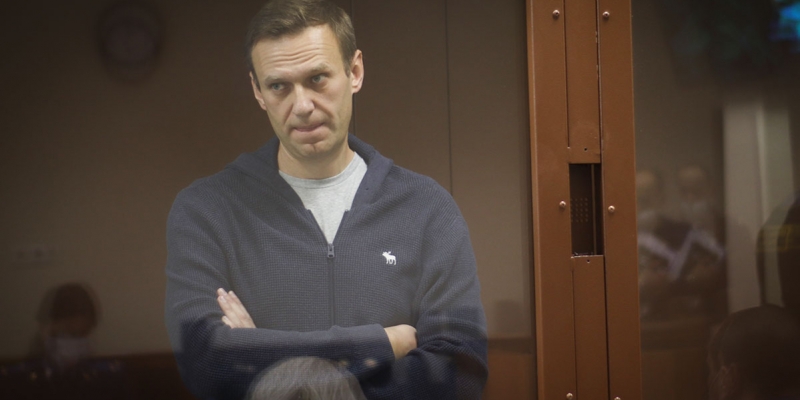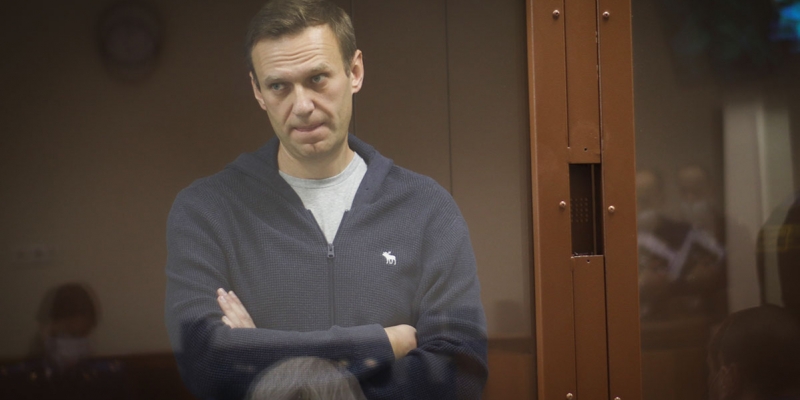Mthe osgorsud, according to documents published on June 23, considered Navalny’s organizations extremist for discrediting the authorities, calling for uncoordinated actions and reposting them by supporters of Nazi symbols and Rammstein clips

Alexey Navalny
The judge of the Moscow City Court, Vyacheslav Polyga, explained the decision to recognize Alexey Navalny’s organizations as extremist and ban them by saying that their members incited hatred and hostility towards government officials, called for uncoordinated rallies, and also used Nazi symbols and paraphernalia. This is stated in the reasoning part of the decision of the Moscow City Court in the relevant case; its full text was published on June 23 by the association “Team 29”, which represented the interests of Navalny’s organizations in the process.
On June 9, the Moscow City Court, at the request of the Prosecutor General’s Office, banned the activities of the Anti-Corruption Fund, its legal entity, the Foundation for the Protection of Citizens ‘Rights (both organizations are recognized as foreign agents) and the public movement “Navalny’s Headquarters”.
Hatred of the security forces and uncoordinated actions
As stated in the motivational part of the decision of the Moscow City Court, the websites of the FBK, the Foundation for the Protection of Citizens ‘ Rights and Navalny’s headquarters, created for the purpose of promoting extremist activities, have repeatedly posted information of an extremist nature. This includes the video “Let’s remember the crooks and thieves their manifesto-2002”, which the Novosibirsk court recognized in 2013extremist material. This video from 2011 quoted the election promises of “United Russia” nine years ago. Subsequently, according to the Sova Center (recognized by the Ministry of Justice as a foreign agent), at least sixty people were fined for publishing this video, including from Yoshkar-Ola, the Voronezh Region, Vologda, Omsk, Tyumen, Mordovia and other regions.
Another argument of the court is that the leaders and members of the FBK, the FZPG and Navalny’s headquarters systematically conduct public events that are not coordinated with the authorities in the prescribed manner. The court lists the protest actions due to the refusal to register independent candidates for the Moscow City Duma in 2019 and due to the arrest of Alexey Navalny in January 2021, and also notes that Kira Yarmysh, Lyubov Sobol, Georgy Alburov are accused of violating sanitary standards (Article 236 of the Criminal Code) in connection with the latest actions.
Navalny’s associates published posts and videos, “encouraging participation in illegal public events, containing false information, discrediting state authorities, and public calls to incite hatred and enmity against government officials,” the document says. During the massat public events organized by them, there were “calls for extremist and terrorist activities”, “violence was used against law enforcement officers in connection with ensuring the protection of public order”, for which many participants of these actions were convicted or are under investigation.
In their “political and extremist” activities, the FBK, the FZPG and Navalny’s headquarters actively involve minors, as well as incite persons who are not direct participants and members of organizations to crimes, the court claims.
The supporters of FBK and Navalny have repeatedly been brought to administrative and criminal responsibility “for holding protest actions, pickets, rallies, committing extremist offenses, namely for calls for extremist and terrorist activities, distribution of extremist materials, propaganda and demonstration of Nazi symbols, calls for violent actions against law enforcement officers,” the court notes.
Among Navalny’s supporters brought to justice for such crimes and offenses, the court names the coordinator of the headquarters in Cheboksary, Semyon Kochkin, who was fined for reposting a sketch from an American TV show that mentioned Chechnya and the Islamic State banned in Russia, the coordinator of the headquarters in Vladivostok, Vladimir Dubovsky, who published a song on VKontaktethe right-wing group “Argentina”, and the head of the Kemerovo headquarters, Stanislav Kalinichenko, who was arrested for three days for publishing an image containing a swastika in Odnoklassniki. Ufa activist Rustem Mulyukov was sentenced to two years of probation for calls for “violent change of the foundations of the constitutional system and violence against government representatives,” the court notes.
The accused and convicted persons in their testimonies spoke about ” political hatred and hostility, intolerance towards certain social groups (law enforcement officers, supporters of active political parties)”They were formed under the influence of the videos and texts of FBK and Navalny,” the court decision claims.
The arguments that the actions of all these people lay outside the scope of the activities of the FBK and Navalny’s headquarters, the court called untenable. The court refused to attach a number of the defendants ‘ evidence to the case.
“Some individual people across the country actually demonstrated [Nazi symbols]. We have only one question: what does the FBK have to do with it? The FBK did not demonstrate this symbolism in any way, and the connection of people with the FBK has not been established, and the court did not even try to establish it. That is, the FBK was charged with something to which they have nothing to do, ” Valeria Vetoshkina, a lawyer of Team 29, told RBC.
Among those who were prosecuted for extremism, the court also names the former coordinator of the Arkhangelsk headquarters, Andrey Borovikov, who was sentenced to 2.5 years in a penal colony for reposting a Rammstein clip, while he was charged not with extremism, but with distributing pornography (Article 242 of the Criminal Code). Before that, Borovikov was fined in 2020 for drug propaganda after reposting the clip of Decla “My ligalayz”.
The list cited by the court also includes the head of Navalny’s headquarters, Leonid Volkov, who left Russia; he is being persecuted for involving minors in protests, violating the sanepidnorm and participating in the activities of an organization that encroaches on the identity of citizens.
Consequences of the court’s decision
The court concluded that Navalny’s organizations “propagandize the ideas of undermining public security and state integrity” of Russia and “pose a real threat to the preservation of the foundations of the constitutional system”, are engaged in “inciting social discord”, hinder the activities of government bodies, including election commissions, and use Nazi paraphernalia. The activities of the FBK, the FZPG and Navalny’s headquarters entail “violation of human and civil rights, causing harm to public order and security,” Judge Polyga is sure.
The actions of the FBK listed in the court decision cannot be considered extremist within the meaning of the law, the Team of 29 is sure. “In general, a closed list of what constitutes extremist activity is contained in article 1 of the federal law “On Countering Extremist Activity”. The prosecutor’s office proceeded from the fact that the FBK calls for a change of power, bypassing the procedures provided for by law-elections. That isuncoordinated protest actions, according to the prosecutor’s office, are equal to calls for a change of power in the country. But how can the FBK try to change the power in the country in other ways? It is impossible for the opposition to coordinate a public event; independent candidates are not allowed before the elections. They simply did not have any methods left, and the prosecutor’s office regarded everything that allegedly does not comply with the law as extremism, ” says Vetoshkina.
The defendants are appealing the court’s decision. If it is approved by the second instance and the Ministry of Justice adds the FBK, the FZPG and Navalny’s headquarters to the list of extremist organizations, employees and volunteers of organizations can be brought as defendants under Article 282.2 of the Criminal Code (organization of the activities of an extremist organization), a possible sentence of up to ten years in prison. Criminal liability is threatened for involvement in the activities of organizations, for their financing, and for demonstrating their symbols. Members of organizations will not be able to actively participate in the elections for some time.
The Prosecutor General’s office demanded to ban the FBK and “the Headquarters Bulk” after their founder returned to Russia from Germany after treatment for severe poisoning. Navalny was arrested, the suspended sentence in the case of “Yves Rocher” was replaced with a real one; now he is being held in a colony in the Vladimir region. Navalny’s detention provoked uncoordinated protests in January, in April, the reason for street protests was the refusal of the colony’s management to allow a doctor to see Navalny, who suffered from back pain and went on a hunger strike.

